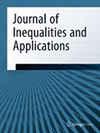数字度量空间中函数不等式的稳定性
IF 1.5
3区 数学
Q1 MATHEMATICS
引用次数: 0
摘要
本文分析了以下不等式的海尔-乌兰稳定性: 0.1 $ $ (textstyle/begin{cases} d (f(\imath +\jmath ), (f(\imath )+\ f(\jmath )))leq d (\rho _{1}((f(\imath +\jmath )+ f(\imath -\jmath ),\ 2f(\imath ))))\hphantom{ d (f(\imath +\jmath ), \ (f(\imath )+\ f(\jmath ))) {}+ d (\rho _{2} (2f (\frac{imath +\jmath}{2} ), \ (f(\imath )+ f(\jmath )))) )\end{cases} $$ 在数字度量空间环境下,其中 $\rho _{1}$ 和 $\rho _{2}$ 是固定的非零复数,通过使用定点法和直接法,$1>\sqrt{2}|\rho _{1}|+||\rho _{2}|$ 。本文章由计算机程序翻译,如有差异,请以英文原文为准。
Stability of functional inequality in digital metric space
In the present article, the Hyers–Ulam stability of the following inequality is analyzed: 0.1 $$ \textstyle\begin{cases} d (f(\imath +\jmath ), \ (f(\imath )+ \ f(\jmath )) )\leq d (\rho _{1}((f(\imath +\jmath )+ f(\imath - \jmath ),\ 2f(\imath )) ) \\ \hphantom{ d (f(\imath +\jmath ), \ (f(\imath )+ \ f(\jmath )) )\leq}{}+ d (\rho _{2} (2f (\frac{\imath +\jmath}{2} ), \ (f(\imath )+ f(\jmath )) ) ) \end{cases} $$ in the setting of digital metric space, where $\rho _{1}$ and $\rho _{2}$ are fixed nonzero complex numbers with $1>\sqrt{2}|\rho _{1}|+|\rho _{2}|$ by using fixed point and direct approach.
求助全文
通过发布文献求助,成功后即可免费获取论文全文。
去求助
来源期刊
自引率
6.20%
发文量
136
期刊介绍:
The aim of this journal is to provide a multi-disciplinary forum of discussion in mathematics and its applications in which the essentiality of inequalities is highlighted. This Journal accepts high quality articles containing original research results and survey articles of exceptional merit. Subject matters should be strongly related to inequalities, such as, but not restricted to, the following: inequalities in analysis, inequalities in approximation theory, inequalities in combinatorics, inequalities in economics, inequalities in geometry, inequalities in mechanics, inequalities in optimization, inequalities in stochastic analysis and applications.

 求助内容:
求助内容: 应助结果提醒方式:
应助结果提醒方式:


